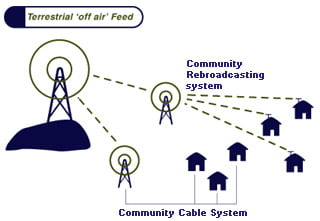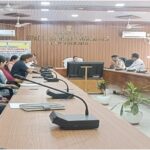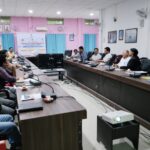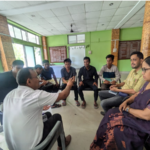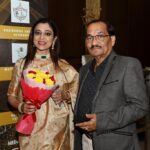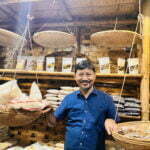Current Status of Development Communication in India from Ethical Perspective with Special Reference to Assam: A Descriptive Content Analytical Study
Mr. Alakesh Das
Before understanding the meaning of the term ‘Development Communication’,we have to understand the term ‘Development’.The term ‘Development’ means ‘positive change’ or ‘change for the better’ in our life. It is such a change which enriches our life, helps us to improve our lifestyle and thereby, lead a modern, scientific and hygienic life anywhere in the world. A manual for news agency reporters brought out by IIMC defines development as the removal of poverty, the lessening of disparity between regions and classes, the building up of the technological insfrastructure, modernization of society through shedding feudalism, tribalism and superstitions, the gradual achievement of economic self reliance. Development is measured in terms of the improvement of the lives of the people and the strengthening of the families or the individual’s capacity to deal with the rest of the society and of the nation’s capacity to deal with the world. Development is not just restricted to the mere upliftment of the economic status of a nation, but involves a whole gamut of issues pertinent to the wellbeing of a group of individuals and the society at large.
Now the term ‘Development Communication’ is a system of communication which is basically utilized for the uplift of the human society in various fields of life. It helps us in improving our living standards. This is because it teaches and makes us learn how to process information which we receive from the mass media. It distributes such information among the masses for the benefit of the latter. Famous Social scientist and communication expert Nora Quebral in 1975 defined the term Development Communication as ‘ it is the art and science of human communication applied to a speedy transformation of a country and the mass of its people
from poverty to a dynamic state of economic growth that makes possible greater social equality and the larger fulfillment of the human potential’. In other words , the process of communication applied for the overall improvement of the general human lifestyle of any nation.
Now coming to the main point of discussion, i.e. the ‘Current Status of Development Communication in India from ethical perspective with special reference to Assam’, it is to be noted that we have to elucidate upon two main points i.e. the current status of development reporting and secondly the current status of development broadcasts or development programmes from ethical perspective.
Development Communication is an essential feature for the Indian situation as we are still a developing nation with a large population. Now coming to the case of Assam, it is to be noted that just like the other parts of North East India, Assam is also lagging behind in diverse areas of development in comparison to the various states of the Mainstream India. So there is a genuine need of development communication in Assam especially in the health and agriculture sector. Assam predominantly being an agrarian state, needs development to a great extent in the agriculture sector. And in this regard, all types of media such as modern mass media, folk and traditional media, alternative media, community media as well as social media can play a big part. But in this research paper, the focus has been basically confined to modern mass media especially the Public Service Broadcasters,i.e. Doordarshan and All India Radio and community media in development communication and ethical perspectives.
This is a descriptive content analytical study with content analysis of a few development programmes and both primary and secondary tools of data collection have been used in this research, As far as the primary data collection tool is concerned, the tool of observation has been used predominantly and of course various secondary data have been used in the study.
In this article, apart from the key terms, i.e. communication, development and development communication, some important aspects of media ethics, such as guidelines of the Prasar Bharati Act,1990, social objectives of Doordarshan, Doordarshan Code, i.e. the All India Radio Broadcasting Code, guidelines of the Broadcast Bill,1997, basic principles of Community Radio Policy Guidelines in India provided by the Ministry of Information and Broadcasting (MIB) have been highlighted. The subject of ethics, right from the days of Plato to the present, has been a matter of serious preoccupation with philosophers, social reformers, academics and concerned citizens of the society. The subject is important not only because it is fundamental to the survival of the civilized society, but also because it eludes proper definition in concrete terms. In short, ethics are the rules of conduct or principles of morality that point us towards the right or best way to act in a situation. The term media ethics means certain rules or conducts to be followed by the media organizations in production and dissemination of programme contents for the welfare of the society. For different types of media houses, different types of regulatory bodies are there for formulating policies and guidelines such as Press Council of India (PCI), Press Commissions, AINEC, BCCC etc. In this research paper, the discussion has been confined to the ethical practices being done by the two Public Service Broadcasters i.e. All India Radio, Guwahati and Doordarshan Kendra, Guwahati and a few Community Radio Stations of Assam i.e.Radio Luit,90.8 FM of Gauhati University, Jnan Taranga,90.4 FM of KKH State Open University of Guwahati and the Brahmaputra Community Radio Station,90.4 FM of Dibrugarh,Assam.
Before understanding the meaning of the term ‘Development Communication’,we have to understand the term ‘Development’.The term ‘Development’ means ‘positive change’ or ‘change for the better’ in our life. It is such a change which enriches our life, helps us to improve our lifestyle and thereby, lead a modern, scientific and hygienic life anywhere in the world. A
manual for news agency reporters brought out by IIMC defines development as the removal of poverty, the lessening of disparity between regions and classes, the building up of the
technological insfrastructure, modernization of society through shedding feudalism, tribalism and superstitions, the gradual achievement of economic self reliance. Now the term ‘Development Communication’ is a system of communication which is basically utilized for the uplift of the human society in various fields of life. It helps us in improving our living standards. This is because it teaches and makes us learn how to process information which we receive from the mass media. It distributes such information among the masses for the benefit of the latter. Famous Social scientist and communication expert Nora Quebral in 1975 defined the term Development Communication as ‘ it is the art and science of human communication applied to a speedy transformation of a country and the mass of its people from poverty to a dynamic state of economic growth that makes possible greater social equality and the larger fulfillment of the human potential’. In other words , the process of communication applied for the overall improvement of the general human lifestyle of any nation.
Now coming to some of the ethical aspects as mentioned above, first let us have a discussion on the social objectives of Doordarshan which are such as to act as a catalyst for social change, to promote national integration, to stimulate a scientific temper in the minds of the people, to disseminate the message of family planning as a means of population control and family welfare, to provide essential information and knowledge in order to stimulate greater agricultural production, to help and promote preserve environmental and ecological balance, to create values of appraisal of art and cultural heritage. Again the All India Broadcasting Code states that broadcast on AIR by individuals will not permit criticism of friendly countries, attack on religion or communities, anything obscene or defamatory, incitement to violence or anything against maintenance of law and order, anything amounting to contempt of court, disrespect to constitution etc. Now coming to the basic principles of Community Radio policy guidelines in India provided by the Ministry of Information and Broadcasting states that an organisation desirous of operating a CRS, must adhere to the principles such as it should be explicitly constituted as a non profit organisation and should have a proven track record of at least three years of service to the local community, it should be designed to serve a specific geographic community or a local community, should have an ownership and management structure that is reflective of the community that the CRS seeks to serve, programmes broadcast should be relevant to the educational, developmental, social and cultural needs of the community and it must be a legal entity i.e. should be registered under the registration of societies act or any other such act relevant to the purpose. As far as CR content regulation and monitoring provided by MIB,GOI is concerned, the programmes should be of immediate relevance to the community with an emphasis on developmental, educational, health,environmental, social welfare, community development and cultural programmes reflecting the specific needs and aspirations of the community, atleast 50% of the contents shall be generated with participation of the local community, programmes should be preferably in local languages and dialects, should adhere to the provision of the programmes and advertising codes as prescribed by the AIR, shall preserve programme contents for atleast three months from the date of first broadcast, generally no news or current affairs programmes to be broadcast, programmes should not do anything defamatory, inflammatory, political, obscene, false, provocative, contemptuous, etc.
Now coming to the main point of discussion, i.e. the ‘current status of development communication in India from ethical perspective with special reference to Assam’, it is to be noted that we have to elucidate upon two main points i.e. the current status of development reporting and secondly the current status of development broadcasts or development programmes from ethical perspective.
Development Communication is an essential feature for the Indian situation as we are still a developing nation with a large population. Now coming to the case of Assam, it is to be noted that just like the other parts of North East India, Assam is also lagging behind in diverse areas of development in comparison to the various states of the Mainstream India. So there is a genuine need of development communication in Assam especially in the health and agriculture sector. Assam predominantly being an agrarian state, needs development to a great extent in the agriculture sector. And in this regard, all types of media such as modern mass media, folk and traditional media, alternative media, community media as well as social media can play a big part. But in this research paper, the focus has been basically confined to the role of modern mass media and community media in development communication.
Now here comes the very objective or rationale of the research paper, i.e. to study the current status of development communication in India from ethical perspective with special reference to Assam, it is to be noted that we have to elucidate upon two main points i.e. the current status of development reporting and secondly the current status of development broadcasts or development programmes of AIR,Guwahati and Doordarshan Kendra,Guwahati and a few community radio stations of Assam from ethical perspective. The main objective of this research paper is to highlight the current status of development communication being practised by the two Public Service Broadcasters of Guwahati and the three community radio stations in Assam from the ethical perspective.
This is a descriptive content analytical study with content analysis of a few development programmes of the mainstream Prasar Bharati media of Guwahati,AIR and DD and the three community radio stations operating from Assam,i.e. Radio Luit,90.8 FM of Gauhati University, Jnan Taranga,90.4 FM of KKH State Open University of Guwahati and the Brahmaputra Community Radio Station,90.4 FM of Dibrugarh,Assam and both primary and secondary tools of data collection have been used in this research.As far as the primary data collection tool is concerned, the tool of observation has been used predominantly ,i.e. the programmes of these respective media outlets have been studied to know the maintenance of ethical standard in doing the development programmes and of course various secondary data have been used in the study such as online data as well as the ones from the printed materials. No major field survey has been done for this study and the various programme contents taken for the study are the samples.
Development Communication is an essential feature for the Indian situation as we are still a developing nation with a large population. It is important to note that we do possess an enormously large amount of resources of all kinds including human and natural ones. But we are yet to achieve the kind of universal development of the masses which should have been the optimum given the country’s situation.
Immediately in the wake of the Independence in 1947, we faced the challenge of bringing about an equitable and regionally-balanced distribution of wealth and development of the distant places of the country with limited resources. But, while the efforts of the government authorities are growing high, the population is also growing at an explosive rate over the years, thus causing a negative effect on all developmental initiatives. India possesses the largest pool of trained manpower in science and technology though our living standard still deserves a lot to be done. That is why, development communication is still highly relevant for the Indian situation and its significance is growing every passing year due to the changing scenario. More than two centuries of colonial rule of the country had left us with a very low level of progress along with an extremely higher rate of exploitation. This has left the state machinery of the country after independence with several major and vital challenges which included a very low level of literacy, lack of an adequate industrial base and infrastructure etc. among others.
Now coming to the case of Assam, it is to be noted that just like the other parts of North East India, Assam is also lagging behind in diverse areas of development in comparison to the various states of the Mainstream India. So there is a genuine need of development communication in Assam especially in the health and agriculture sector. Assam predominantly being an agrarian state, needs development to a great extent in the agriculture sector. And in this regard, all types of media such as modern mass media, folk and traditional media, alternative media, community media as well as social media can play a big part. . But in this research article the focus has been basically confined to modern mass media and community media in development communication from ethical perspective, Now the perspective of ethics has been brought into the consideration because of the fact that many a times the ethical violation is also visible in the development programmes, that is why this study is significant as this will highlight the current status of development communication in Assam from the ethical perspective.
For this study a descriptive content analysis technique has been adopted, i.e. some specific programmes of the two Public Service Broadcasters of Guwahati AIR and DD and the three community radio stations operating from Assam namely from the Gauhati University Institute of Distance and Open Learning (GU IDOL), i.e. Radio Luit, 90.8 FM, Jnan Taranga,90.4 FM from KKH State Open University,Guwahati and the Brahmaputra Community Station,90.4 FM from Dibrugarh, Assam, have been taken as samples to highlight the current status of development communication in Assam from the ethical perspective. So the analysis is as follows in brief——–
The term development reporting refers to the reporting of development related issues. It refers not just to reporting development, but also the lack of it, i.e. under development. There are quite a lot of people concerned with the activity of development communication or reporting. Such as the media personnels, voluntary associations or agencies engaged in the field of journalism and media are doing their bit in this field. Yet the cause of development reporting has not been served in ideal manner so far in Assam and many parts of India.
Because majority of the newspapers, magazines, TV and radio channels or media tools are in the private sector jurisdiction and we all know that the primary goal of all private enterprises are to make maximum profits and this explains the lack of interests in this type of news or stories in our media at the moment. Although the public service broadcasters like AIR and DD are definitely taking up a major initiative in terms of development reporting. More so, it can be stated that the three community radio stations of Assam namely Radio Luit of Gauhati University, Jnan Taranga of KKHSOU and Radio Brahmaputra of Dibrugarh are doing the development reporting in the truest sense of the term especially for the development of the particular target communities. These three community radio stations of the state are broadcasting various development programmes such as health programmes, farm broadcasts, educational programmes, cultural programmes, women’s programmes, children’s programmes, musical programmes, sports programmes, programmes on legal subjects, interactive programmes including live phone in programmes giving voice to the voiceless communities. Similarly in other parts of India also the community radio movement has gained ground since the historic verdict delivered by the Supreme Court of India in 1995 that ‘Airwaves are public property’. But unfortunately it has to be stated that in the mainstream commercial media of Assam and even in a large chunk of mainstream national media, the development reporting is not a priority, whenever such stories are focused, then it is usually an exception, not a routine. Because such development stories are normally not very popular with no sensationalism and thereby lacking the attributes to attract more people than otherwise. It is noticeable that in India as well as in Assam, the commercial media entities have the tendency of giving coverage to spicy or gossip stories particularly centering round the celebrities rather than focusing much on the development stories. Still at times even the commercial media outlets apart from the public service broadcasters and community media do the development reporting to popularize it amongst the masses for achieving long term goals. It can be mentioned here that the coverage of the ginger farmers in Karbi Anglong district of Assam was published in ‘The Frontline’. Not only this , most of the issues of this magazine do publish interesting development stories for the target audiences. Similarly, ‘The Indian Express’ also carries some development news items regularly in its issues from time to time. Similarly, the Press Institute of India, Chennai, has been regularly publishing one journal titled ‘Grassroots’ for quite a long time now. This journal is promoting news items from the field of development which are deemed capable of encouraging other people also to think in similar ways. More so, a few universities in India as well as Assam such as IGNOU, KKHSOU, Dibrugarh University etc are offering courses in Rural Development in is a which development reporting major prerequisite. On the other hand there is an institute of agriculture management and development in Hyderabad established under the central government which is offering a formal diploma course in agriculture journalism. The Mass Communication Research Centre( MCRC) of Jamia Millia Islamia University in Delhi has been conducting a comprehensive diploma course in development communication. Indian Institute of Mass Communication( IIMC), Delhi has been conducting a four month long diploma course in development communication for serving journalists, NGO workers, govt. officials from India and foreign nations. These courses have been so popular over the years as well as contributing to the uplift of people in all fields of life. Further, the National Council for Science and Technology ( NCSTC) of the Ministry of Science and Technology of Govt. of India has been promoting communication of scientific findings and developments to the masses on a regular basis. It is also publishing a journal called ‘Indian Journal of Science Communication’ for creating awareness among the people about the theme. On the other hand there are quite a few NGOs and voluntary communication organizations which are engaged in an interesting activity. That is they are providing training in handling audio video equipments to their volunteer members or workers for programme production on developmental issues. These are broadcast in the local community radio or shown at smaller closer gatherings to instruct the members of the target audiences.
Now coming to the aspect of the current status of development broadcasts, in India particularly in Assam from ethical perspective then we have to refer to the public service broadcasters i.e. AIR and DD which have been airing various development programmes such as farm broadcasts, health broadcasts, rural broadcasts, programmes on women empowerment, child development, insfrastructural development, consumer rights, universal adult education, girls’ education, safe maternity practices, behavioural changes and many more. In this context, it can be stated that Doordarshan started the Krishi Darshan Programme in 1967 and DDK, Guwahati started the programme in the early part of 2000. DD National is the largest terrestrial network in the world covering about 91.2% population and 79% land area of the country. Being a Public Service Broadcaster, the channel continues to make significant contribution to accelerate socio economic change, promote national integration and stimulate scientific temper. The primary channel of DD has 3 major components of programme contents, information education and entertainment. The education component is drawn from the contributions of IGNOU,UGC,CIET,SIET and other education based sponsored programmes. Being a PSB, it strives to carry messages in its progs on means of IT and family welfare, preservation of environment and ecological balance highlighting the need for social welfare measures for women, children and less privileged.
The Development Communication Division( DCD) established in March, 2001,functions as a single window marketing division and a production house for govt. ministries and public sector undertakings. DCD has succeeded in revitalizing in house production activities within DD and has produced on various subjects such as health, investors’ protection tribal affairs, adult education, rural development, petroleum conservation, consumer affairs, environment and forensic etc. DDK, Guwahati’s Health Magazine Programme ‘Kalyani’ which was later known as ‘Ayushman Bharat’,the Sponsored programme, the Inhouse programmes ‘Swasthya Anushthan’ and ‘Sikitcha Nidan’ and agriculture programmes such as ‘Krishi Darshan’ along with other socio economic and cultural issues have been very useful in creating public awareness and knowledge about these issues which is very necessary for all round development of the people and the region. Apart from DD National, the DDK,Guwahati also has been broadcasting various development programmes such as Vigyan Prasar( Science Programme.), Swachh Bharat( Health Programme), DD Classroom( Educational Programme), Ayushman Bharat( Health Programme), Art of living/health tips, Grahak Suraksha( Programme of Jaga Grahak Jaga), Ainee Sewa( Programme on legal service), Yuva Darpan( Youth Programme), Krirangan ( Sports Programme), Sarba Mangalam( Programme on minority and ethnic group), Chipungh( Bodo language Programme), Ramdhenu( Childre’s Programme), Chah gachar maje maje( tea garden Programme), Manashi( family magazine Programme), Poribesh( Programme of environmental awareness), Gramjyoti( programme. on Panchayati Raj) . In short it can be stated that DDK,Guwahati as a Public Service Broadcaster, is telecasting the following programmes on developmental issues regularly, i.e. Krishi Darshan, Ayushman Bharat and Bharat Nirman. Krishi Darshan is daily programme on five days a week in collaboration with the ministry of Agriculture, GOI under the scheme Mass Media Support to Agriculture Extension. This field based programme covers various aspects of agriculture such as horticulture, animal husbandry, dairy and rural life, pisciculture, sericulture, floriculture, poultry farming etc.
All India Radio ,Guwahati is having the farm broadcast called Krishi Jagat of 30 minutes duration and broadcast daily, Krishi Katha of 5 minutes duration and broadcast daily, Khetir Diha of 5 minutes duration and broadcast daily, Kheti Patharot etc. Again it is having the health broadcasts like Dr.Online, Nidan etc.More so,AIR,Guwahati is having other development programmes such as Gayan Shrutar Anusthan,i.e. programmes for rural general programme of 25 minutes duration and broadcast once in a week on every Saturday.Similarly there is the programme named Gayan Mahilar Anusthan i.e. Rural Women Programme of 15 minutes duration and broadcast once in a week on every Wednesday, Gayan Yuva Aru Shishu Anusthan, i.e. Rural Youth and Children programme of 20 minutes duration and broadcast once in a week on every Monday. Under the Krishi Kotha Programme various issues are highlighted such as agronomy, soil science, meteorology, horticulture, food processing, water management, animal husbandry, veterinary, pisciculture, sericulture, apiculture and co-operation, social forestry, environment, pollution control agriculture extension, agri-implements farm management, non formal and adult education, handloom and textile and handicraft.
Again the three community radio stations operating from Assam namely Radio Luit 90.8 FM,Gauhati University IDOL, Jnan Taranga 90.4 FM of KKHSOU, Guwahati and Radio Brahmaputra 90.4 FM of Dibrugarh,Assam are broadcasting various development programmes on health, education, local culture, law, folk music, science and technology, family welfare, agriculture, entertainment, women,children etc. strictly adhering to the CR Policy Guidelines given MIB,GOI. Radio Luit,90.8 FM, the Community Radio Service of Gauhati University,does the development broadcasts such as Sariram Adhyam, the Health broadcast in the interview format, Educational talks, Bidhan Samidhan, interview programme on legal issues from the community, farm hint programmes, social advertisements such as on Bharat Nirman, Safe Drinking Water, Safe Maternity Practices etc. by empanelment with DAVP. Apart from that many other programmes are there such as quiz programme called Quizzeria involving community memebers, Aalap, an interview format with community members, Amar ghar,field based interview format with community members, Bandhabi, a series of women’s health and nutrition related programme with community women under a project of NCSTC (National Council of Science and Technology Communication, DST, GOI with the project title ‘Science for Women’s Health and Nutrition for Community Radio Stations’ and the programmes are being produced and broadcast by community women on Radio Luit,90.8 FM. Similarly the signature programme Mukoli Chora, the live phone in programme is the voice to voiceless for community members on their issues on air. Similarly there are programmes on folk music performed by local community members, programme on science in feature format i.e. Bigyan Prasanga is there done by community members, Women based programme for community members named ‘Malini’ is there, Children based programme as ‘Kakoli’ is there, Audio magazine named ‘Patrika’ on various issuses done by community memebers including students. Apart from three newly introduced programmes of Radio Luit are ‘Jivika’—a programme on skill development, ‘Sarathi’—a programme on disaster management, ‘Deuka’-a programme on disability issues .More so, ‘Krishi Katha’—a farm hint programme. Deuka—Programme for differently abled by Radio Luit in collaboration ‘Sparkha Asom’, NGO assisted by IIRDA(Indian Institute of Research and Development for differently abled’, Department of Disabilities Studies, GU which is b’cast from 6-30 pm to 7 pm every Tuesday. Jeevika—Programme on skill development produced and b’cast by Radio Luit, Dr. Anamika Ray Memorial Trust(ARMT) in collaboration with Commonwealth Educational Media Center for Asia(CEMCA). The only hardcore Farm Broadcast of Radio Luit,90.8 FM, the Community Radio Service of Gauhati University, ‘KRISHI KATHA’ was started in July, 2011, with the participation of some scientists and officers of the Krishi Vigyan Kendra(KVK), Kahikuchi, Guwahati. Later, the programmers started using contents from some agricultural books and articles from other sources. In the ‘KRISHI KATHA’, usually these formats have been adopted so far viz. Interview, Discussion and Talk.
Sometimes, farmers also take part in this programme who share their success stories and other problems they usually face.
Currently, the state of ‘KRISHI KATHA’ is not much active, but soon we will do some collaboration with KVK and other agri-based organizations to keep the farmer communicated with Radio Luit and make them aware about all agricultural informations.
It goes on air twice/thrice in a week. One is fresh and another repeat. It is of 30 minutes duration.
It goes on air in Radio Luit,90.8 FM on Monday, Wednesday and Friday from 11-30 am onwards generally for half an hour duration.
Sometimes, this programme is done field based and some other times studio based.
More so, the management structure is pretty much reflective of the community as most of the Radio Activists including the programme executive are from the student community of GU IDOL and GU overall. More so Radio Luit has the management committee as Vice Chancellor as the chairman and the other professors and community members.
Again coming to the case of Jnan Taranga the following things can be highlighted—-
Jnan Taranga broadcasts for 24 hours regularly. The broadcast schedule consists of Live 8 hours which starts from 9 AM in the morning till 1 PM including complete community based programmes like health tips, environment based programmes, life of a great person alongwith birthday wishes, satire and beauty tips. Educational broadcast is for one hour i.e. from 1 PM to 2 PM.
The broadcast content of Jnan Taranga mainly consists of community-based programmes. The programmes are on subjects like health, sports, career, science, woman, children, agriculture, horticulture, climate change, environment etc. The university’s motto is to disseminate education transcending all barriers. Yet, it realises that some disadvantaged sections are deprived from attaining formal education. In order to communicate with the under-privileged sections of the society, the university decided to use the medium of radio, which remains a popular medium with the belief that education and community users are not mutually exclusive.
The folk culture of Assam was becoming fatal from quite sometime especially in urban areas. It has been tried to be revived in the programme Parampara. The voices of marginalized people are broadcast in the programme Topal Topal. Programme on tourism spots and monuments have been highlighted in the programme Chinaki Batere Apunar Jatra. There is a regular live phone-in programme Manar Khabar for one hour where listeners make calls and provide their views on problems and issues. Keeping in view the different sections of the society, youth oriented programmes like Yuva Taranga and Sishu Tirtha for children is broadcast. Hengul Baran is a programme on lives and experiences of senior citizens. The voices of tribals and ethnic groups of the state are highlighted in the programme Janajiwan. We have broadcast programmes on street singers titled as Lecheri Butoli and on woman health named Sakhi Sanjeevani. Live from community is a programme where radio reporters interact with the community people and the later participate. Apart from local community programmes, to safeguard the rights of the common people, Jnan Taranga is broadcasting programmes on various citizen’s rights including Right to Information and Right to Education.
Now coming to the Brahmaputra Community Radio Station,90.4 FM of Dibrugarh, Assam, the following points can be highlighted—–
The Brahmaputra Community Radio Station 90.4 FM (BCRS), a non-profit community radio station is the first grassroots station of its kind in North-East India which was started in association with UNICEF in the year 2009 by Centre for North-East Studies and Policy Research. It is situated in the bank of River Brahmaputra at Maijan Borsaikia Gaon, near Maijan Ghat.
In the coverage of community radio station, Radio Brahmaputra’s frequency (90.4 FM) is covering near about 6.5 laks population of Dibrugarh, Dhemaji and a part of Lakhimpur and Arunachal Pradesh. In the Dibrugarh, from East and west circle of the district, In Dhemaji out of 7 Blocks its covering 6 blocks of the district and a small part of Lakhimpur District and Arunachal Pradesh.
Radio Brahmaputra is broadcasting program in five different language and dialects (Assamese, Chadri, Mishing, Bodo and Bhojpuri) covering the most marginalized community of tea gardens, Island, general Assamese villages of the districts. It broadcast its program from Monday-Sunday from 9 AM to 7 PM regularly in three language and dialect (Assamese, Chadri (tea garden dialect), Bhojpuri) and by weekly in Bodo and Mishing including the range of program for Health, Education, Entertainment, general knowledge, current affairs, Agriculture, Development issues, governance and rights, government flagship program, local customs and traditions, folk culture, songs and many more.
So, it can be concluded that at present the development communication in India and also particularly in Assam is being practiced by the public service broadcasters, community media and a handful of print media predominantly. The commercial private media houses are still very reluctant in terms of development programmes. So overall the development communication’s success in the present day period to a great extent depends on the Public Service Broadcasters and community media. More so the ethical aspect is very much being practised by this media houses taken for the study.
After the descriptive content analysis of the various programmes of the two public service broadcasters of Guwahati namely AIR and DD and the three community radio stations operating from the state of Assam, it can be concluded that major issues such as health, agriculture, sanitation, rural infrastructure, community development, folk culture, women, children, law, education etc are being highlighted by means of various programmes. More so, it was very much noticeable after the content analysis of these media outlets of the state of Assam that the two Public Service Broadcasters i.e AIR and DDK, Guwahati are very much adhering to the ethical aspects such as Prasar Bharati Codes and Guidelines,AIR Codes and guidelines, Doordarshan codes and guidelines. For example programmes are being on consumer rights, family welfare, women empowerment, health, agriculture, horticulture, floriculture etc and the Community Radio Guidelines of the Ministry of Information and Broadcasting are being very much followed by these three community radio stations. For example in terms of organizational structure, programme contents, coverage area, advertisements etc. The organizational structure is very much reflective of the target community, the programmes are being done mostly in local languages and dialects, the coverage area is within the stipulated range of 15 kilometers, no commercial advertisements are being broadcast, only advertisements of DAVP are being broadcast, mostly programmes are being produced and broadcast by the active community participation, mostly programmes are done on development issues, all the three community radio stations of Assam are being run by non profit organizations, two are campus based in educational institutions,i.e. Radio Luit 90.8 FM, Gauhati University and the Jnan Taranga 90.4 FM, KKH State Open University, Guwahat and the one in Dibrugarh being run by NGO,i.e. the Brahmaputra Community Radio Station,90.4 FM.
That was a brief descriptive content analytical survey done on the two Public Service Broadcasters of Guwahati namely AIR,Guwahati and DDK,Guwahati and the three community radio stations operating from Assam namely Jnan Taranga, KKHSOU, Guwahati, Radio Luit, Gauhati University,Guwahati and Radio Brahmaputra,Dibrugarh.
Reference:
Aggarwal, V. B. & Gupta, V. S. (2001). Handbook of Journalism and mass communication. Concept Publishing Company.
Estrada Restrepo Sonia & Fraser Colin(2001) —— ‘ Community Radio Handbook’(UNESCO)
Community Radio in India—Towards Diversity and Sustainability
Community Radio Compendium-2016 researched and edited by OneWorld Foundation India
Ahuja, R. (2008). Research methods. Rawat.
Kumar, K. J. (2000). Mass communication in India. Jaico Publishing House,
Wimmer, R. D., & Dominick, J. R. (2000). Mass media research: An introduction. Wadsworth, Belmont, CA.

